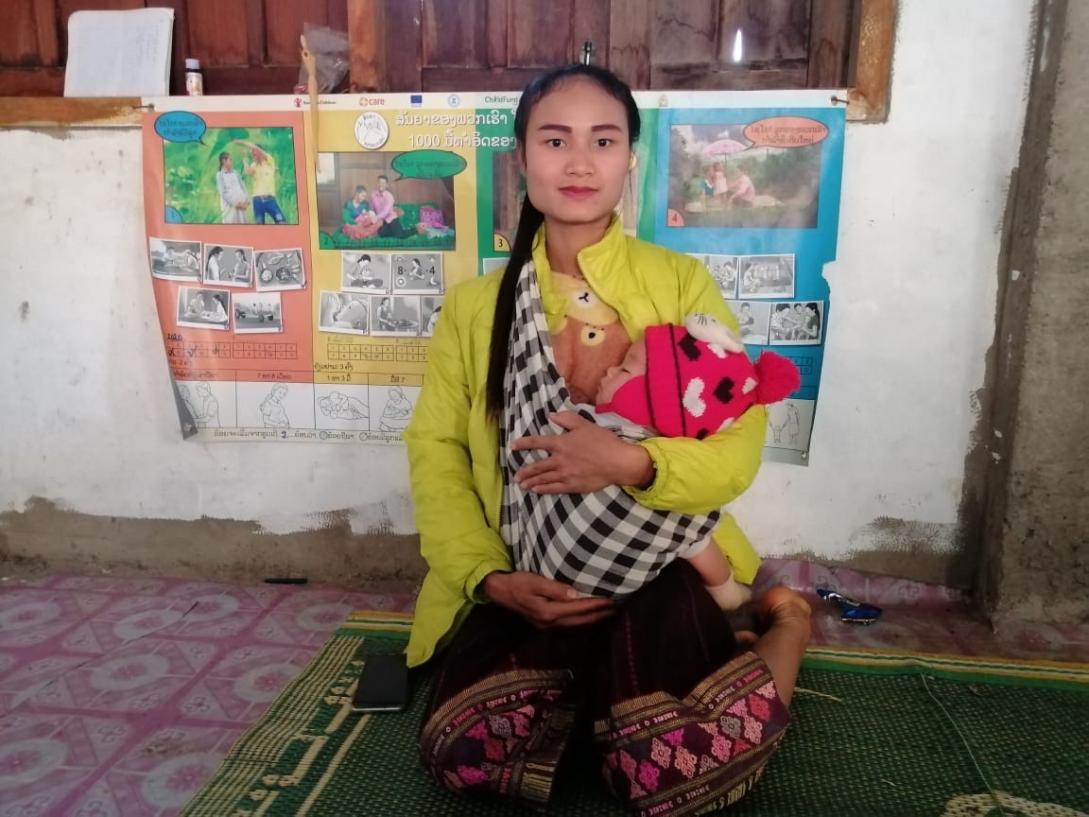“Breastmilk is the source for healthy nations”

“Breastmilk is the source for healthy nations”
Ms Ien is Phunoi and 21 years old, she lives in Ngapoung village, Phongsaly district, with her husband’s family composed of five people including her two children. Their main activity is tea leaves collection and selling. “Because collecting the tea leaves takes a lot of time, I gave my first child rice and powdered milk when he was three months old. But the facilitator from the EU funded SCALING project explained what to do for pregnant women and their babies. Now I’ve got a second child and he is nine months old. I will continue to breastfeed and give him some other food. I see he is growing very well and has good health”.
The Sustainable Change Achieved through Linking Improved Nutrition and Governance (SCALING) project aims to improve food and nutrition security in 420 villages in 14 districts in Huaphanh, Luang Namtha, Luang Prabang and Phongsaly provinces in Northern Laos with a special focus on adolescent girls, pregnant and lactating women, and children under 5 years old.
Did you know that breastfeeding within the first hour of birth (colostrum) protects new-born babies from infections and saves lives?
Breastfeeding is a natural preventive practice and protective barrier against many infectious and non-communicable diseases in both infants and mothers. Indeed, it decreases the risk of diarrhoea, respiratory diseases, middle ear infections, leukaemia and asthma among children, and contributes to the strengthening of immune systems through antibodies in the breast milk. It also reduces the risk of breast cancer in the mother.
Breastfeeding is vital to a child’s lifelong health, and reduces costs for health systems and families. Breastfeeding also improves brain development and school attendance, and is associated with higher income in adult life.
The marketing of breast milk substitutes is a threat against this natural and vital practice. The main goal of large manufacturing food companies is to market their product, no matter the means or the ends. In other words, infant formula manufacturers have a duty to elevate the sales of baby formula and convince new mothers of the benefits of their nutritional product compared to breastfeeding. Their for-profit agenda leads to adverse health impacts through misleading and faulty advertising activities.
The Government of Lao PDR has reached an important milestone to control the damage by adopting the International Code of Marketing Breast-milk Substitutes in December 2019, locally named as “Decree on Food Products and Feeding Equipment for Infants and Toddlers”.
The decree aims to protect and promote breastfeeding by prohibiting unethical marketing activities aiming to promote breast milk substitutes. By applying international and national regulations, the detrimental effects on breastfeeding success caused by baby formula promotions could be limited, preventing the increase in misperceptions among mothers about the benefits of using infant formula.
However, despite the presence of multiple laws and international legislation safeguarding the importance of breastfeeding, poor enforcement of these regulations still exists. Therefore, the nationwide implementation and support of breastfeeding can significantly contribute to the improvement of maternal health and child health, and thus reduce the burden of morbidities and mortalities occurring within these two population groups.
Lao PDR has shown significant improvements in the nutritional status of children under 5 over the past 10 years. Nevertheless, breastfeeding rates are still low; 45% of infants under six months are exclusively breastfed (Lao Statistics Bureau & Ministry of Health, 2016).
The European Union cooperation with Lao PDR is very much attached to the Nutrition cause with special attention to the 1,000 days. By applying a multi-dimensional approach, EU-funded projects in Lao PDR support the implementation of the National Nutrition Strategy (2016-2025) from national to village levels, and address nutrition through behaviour change, health systems strengthening, gender equality, water, sanitation and hygiene, nutrition-sensitive agriculture and coordination across different line ministries.
Budget support is central to European Union’s international cooperation; it involves direct financial transfers to the national treasury engaging in sustainable development reforms. In Lao PDR, the EU cooperation supports directly the State budget to accomplish specific targets in the nutrition agenda up to 2022, including the national decree on ‘infant and young child product control’, among others (BMS decree).
The EU cooperation continues to support the nutrition community in dissemination and monitoring of the BMS Decree across the country at different levels to protect breastfeeding and promote good nutrition and wellbeing for all Lao people.
- End -
“ນົມແມ່ ເປັນແຫຼ່ງອາຫານທີ່ສໍາຄັນຕໍ່ສຸຂະພາບທີ່ດີຂອງຊາດ”
ນາງ ອ່ຽນ ເປັນຄົນຊົນເຜົ່າພູນ້ອຍ ອາຍຸ 21 ປີ ອາໄສຢູ່ນໍາຄອບຄົວສາມີກັບລູກສອງຄົນ ລວມກັນທັງໝົດເປັນຫ້າຄົນທີ່ບ້ານ ຢາປຸງ, ເມືອງຜົ້ງສາລີ. ກິດຈະກໍາຫຼັກສຳລັບການດໍາລົງຊີວິດພວກຂອງເຂົາແມ່ນການເກັບກ່ຽວ ແລະ ຂາຍໃບຊາຂຽວ. “ເນື່ອງຈາກການເກັບໃບຊາຂຽວຕ້ອງໄດ້ໃຊ້ເວລາດົນ, ຂ້ອຍເລີຍເອົາເຂົ້າກັບນົມຜົງໃຫ້ລູກຄົນທໍາອິດກິນຕອນລາວມີອາຍຸໄດ້ສາມເດືອນ. ແຕ່ເມື່ອອາສາສະໝັກໃຫ້ຄຳປຶກສາ ໂຄງການຮ່ວມມືປັບປຸງດ້ານໂພຊະນາການ SCALING ທີ່ສະໜັບສະໜູນໂດຍ ສະຫະພາບ ເອີຣົບ ໄດ້ມາອະທິບາຍສູ່ຟັງກ່ຽວກັບວິທີການ ແມ່ຄວນປະຕິບັດ ໃນເວລາຖືພາ ແລະ ເວລາມີລູກນ້ອຍ. ດຽວນີ້ຂ້ອຍມີລູກນ້ອຍເປັນຜູ້ທີສອງ ລາວມີອາຍຸໄດ້ເກົ້າເດືອນແລ້ວ ແລະ ຂ້ອຍໄດ້ສືບຕໍ່ລູກກີນນົມແມ່ ແລະ ເອົາອາຫານເສີມໃຫ້ລາວກີນຄຽງຄູ່ກັນໄປ. ຂ້ອຍສັງເກດເຫັນວ່າລາວມີການເຕີບໂຕໄວ ແລະ ມີສຸຂະພາບແຂງແຮງດີ”.
ໂຄງການຮ່ວມມືປັບປຸງດ້ານໂພຊະນາການ (SCALING) ແມ່ນເລັງໃສ່ການປັບປຸງຄວາມໝັ້ນຄົງດ້ານສະບຽງອາຫານ ແລະ ໂພຊະນາການຂອງ 420 ບ້ານໃນ 14 ເມືອງ ຂອງແຂວງຫົວພັນ, ຫຼວງນໍ້າທາ, ຫຼວງພະບາງ ແລະ ແຂວງຜົ້ງສາລີ ໃນພາກເໜືອຂອງປະເທດລາວ ໂດຍເນັ້ນໜັກໃສ່ເດັກຍິງ, ແມ່ຍິງຖືພາ ແມ່ຍິງທີ່ພວມໃຫ້ນົມລູກ ແລະ ເດັກນ້ອຍອາຍຸ 5 ປີ ລົງມາ.
ທ່ານຮູ້ບໍ່ວ່າການໃຫ້ນົມລູກໃນໄລຍະໜຶ່ງຊົ່ວໂມງຫຼັງເກີດ (ນໍ້ານົມເຫຼືອງ) ຈະຊ່ວຍປ້ອງກັນເດັກເກີດໃໝ່ຈາກການຕິດເຊື້ອ ແລະ ສາມາດຊ່ວຍຊີວິດໄດ້?
ການລ້ຽງລູກດ້ວຍນົມແມ່ ເປັນເຄື່ອງມືປ້ອງກັນທາງທຳມະຊາດ ແລະ ເປັນຕົວຊ່ວຍຕ້ານກັບບັນດາພະຍາດຕິດຕໍ່ ແລະ ພະຍາດທີ່ຕິດຕໍ່ບໍ່ໄດ້ ຫຼາຍຊະນິດໃຫ້ແກ່ແມ່ ແລະ ເດັກອ່ອນ. ນໍ້ານົມແມ່ຈະຊ່ວຍຫຼຸດຄວາມສ່ຽງຂອງພະຍາດຖອກທ້ອງ, ພະຍາດທາງລະບົບຫາຍໃຈ, ການຕິດເຊື້ອຫູກາງ, ມະເຮັງເມັດເລືອດຂາວ ແລະ ພະຍາດຫືດໃນເດັກນ້ອຍ ພ້ອມທັງປະກອບສ່ວນສ້າງຄວາມເຂັ້ມແຂງໃຫ້ລະບົບພູມຄຸ້ມກັນ ໂດຍຜ່ານສານພູມຕ້ານທານທີ່ໄດ້ຈາກນໍ້ານົມແມ່. ນອກນີ້, ການລ້ຽງລູກດ້ວຍນົມແມ່ຍັງຊ່ວຍຫຼຸດຄວາມສ່ຽງໃນການເປັນມະເຮັງເຕົ້ານົມໃຫ້ຜູ້ເປັນແມ່.
ການລ້ຽງລູກດ້ວຍນົມແມ່ ມີຄວາມສໍາຄັນຕໍ່ສຸຂະພາບໃນທຸກຊ່ວງຊີວິດຂອງເດັກ ແລະ ຊ່ວຍຫຼຸດຄ່າໃຊ້ຈ່າຍໃຫ້ແກ່ລະບົບສາທາລະນະສຸກ ແລະ ຄອບຄົວ. ການລ້ຽງລູກດ້ວຍນົມແມ່ ຍັງມີສ່ວນຊ່ວຍປັບປຸງການພັດທະນາສະໝອງ ແລະ ການເຂົ້າໂຮງຮຽນ ເຊິ່ງຕິດພັນໄປເຖິງການສາມາດມີລາຍຮັບທີ່ສູງຂຶ້ນເມື່ອເດັກເຕີບໂຕເປັນຜູ້ໃຫຍ່.
ການຕະຫຼາດທີ່ຊັກຈູງໃຫ້ນໍາໃຊ້ຜະລິດຕະພັນແທນນໍ້ານົມແມ່ ເປັນໄພຂົ່ມຂູ່ຕໍ່ກັບຫຼັກການປະຕິບັດທາງທໍາມະຊາດ ທີ່ມີຄວາມສໍາຄັນນີ້. ເປົ້າໝາຍຫຼັກຂອງບັນດາບໍລິສັດຜະລິດອາຫານຂະໜາດໃຫຍ່ແມ່ນເຮັດການຕະຫຼາດສຳລັບຜະລິດຕະພັນຂອງຕົນເທົ່ານັ້ນ ໂດຍບໍ່ໄດ້ໃສ່ໃຈ ແລະ ຄຳນືງເຖີງຜົນຕາມມາພາຍຫຼັງ. ເວົ້າອີກຢ່າງໜຶ່ງຄື ຜູ້ຜະລິດນົມຜົງສໍາລັບເດັກນ້ອຍມີໜ້າທີ່ເພີ່ມຍອດຂາຍນົມຜົງ ແລະ ຊັກຈູງໃຫ້ແມ່ທີ່ເກີດລູກໃໝ່ເຂົ້າໃຈວ່າຜົນປະໂຫຍດຂອງຜະລິດຕະພັນທາງໂພຊະນາການຂອງພວກເຂົາທຽບເທົ່າໄດ້ກັບການລ້ຽງລູກດ້ວຍນົມແມ່. ແຜນການຫາກຳໄລເພີ່ມຂອງບໍລິສັດເຫຼົ່ານີ້ໄດ້ສົ່ງຜົນກະທົບດ້ານລົບຕໍ່ສຸຂະພາບ ຍ້ອນການໂຄສະນາຊວນເຊື່ອທີ່ຊັກຈູງໄປທາງທີ່ຜິດ ແລະ ບໍ່ຖືກຕ້ອງ.
ລັດຖະບານແຫ່ງ ສປປ ລາວ ໄດ້ບັນລຸຈຸດໝາຍສໍາຄັນໃນການຄວບຄຸມຄວາມເສຍຫາຍດັ່ງກ່າວ ດ້ວຍການຮັບຮອງເອົາກົດລະບຽບສາກົນໃນການເຮັດການຕະຫຼາດສິນຄ້າທົດແທນນໍ້ານົມແມ່ ໃນເດືອນທັນວາ 2019 ກໍ່ຄື “ດຳລັດວ່າດ້ວຍຜະລິດຕະພັນອາຫານ ແລະ ອຸປະກອນກ່ຽວກັບອາຫານສຳລັບເດັກອ່ອນ ແລະ ເດັກນ້ອຍ”.
ດຳລັດສະບັບດັ່ງກ່າວແມ່ນເພື່ອປົກປ້ອງ ແລະ ສົ່ງເສີມການລ້ຽງລູກດ້ວຍນົມແມ່ ໂດຍຫ້າມບໍ່ໃຫ້ມີກິດຈະກໍາເຄື່ອນໄຫວທາງການຕະຫຼາດທີ່ຊັກຈູງການປ່ຽນແທນນໍ້ານົມແມ່. ຜ່ານການປະຕິບັດນຳໃຊ້ກົດລະບຽບລະດັບສາກົນ ແລະ ລະດັບຊາດ, ຜົນກະທົບທີ່ເກີດຈາກການຊັກຈູງໃຫ້ໃຊ້ນົມຜົງ ທີ່ເປັນອັນຕະລາຍຕໍ່ຄວາມສໍາເລັດໃນການລ້ຽງລູກດ້ວຍນົມແມ່ຈະຖືກຫຼຸດຜ່ອນຈໍາກັດລົງ, ຊ່ວຍສະກັດກັ້ນການສ້າງຄວາມເຂົ້າໃຈທີ່ຜິດໆແກ່ຜູ້ເປັນແມ່ກ່ຽວກັບຜົນປະໂຫຍດຂອງການໃຊ້ນົມຜົງ.
ແນວໃດກໍ່ຕາມ, ເຖິງແມ່ນວ່າມີກົດໝາຍຫຼາຍສະບັບ ແລະ ລະບຽບການສາກົນທີ່ຊ່ວຍປົກປ້ອງຄວາມສໍາຄັນຂອງການລ້ຽງລູກດ້ວຍນົມແມ່, ແຕ່ການປະຕິບັດນໍາໃຊ້ກົດລະບຽບເຫຼົ່ານີ້ຍັງເຮັດບໍ່ທັນໄດ້ດີເທົ່າທີ່ຄວນ. ສະນັ້ນ, ການຈັດຕັ້ງປະຕິບັດ ແລະ ຊຸກຍູ້ໃຫ້ລ້ຽງລູກດ້ວຍນົມແມ່ໃນທົ່ວປະເທດຈະສາມາດປະກອບສ່ວນຢ່າງສໍາຄັນເຂົ້າໃນການປັບປຸງສຸຂະພາບຂອງແມ່ ແລະ ເດັກ ແລະ ຫຼຸດຜ່ອນພາລະຂອງການເຈັບເປັນ ແລະ ອັດຕາການເສຍຊີວິດທີ່ເກີດຂຶ້ນໃນສອງກຸ່ມປະຊາກອນນີ້.
ໃນໄລຍະ 10 ປີທີ່ຜ່ານມາ ສະພາບໂພຊະນາການຂອງເດັກອາຍຸຕໍ່າກວ່າ 5 ປີ ຢູ່ ສປປ ລາວ ໄດ້ຮັບການປັບປຸງໃຫ້ດີຂຶ້ນໃນຫຼາຍດ້ານ. ເຖິງຢ່າງໃດກໍ່ຕາມ, ອັດຕາການລ້ຽງລູກດ້ວຍນົມແມ່ຍັງຕໍ່າ; ມີພຽງ 45% ຂອງເດັກນ້ອຍລຸ່ມ 6 ເດືອນທີ່ໄດ້ກິນນົມແມ່ພຽງຢ່າງດຽວ (ສູນສະຖິຕິແຫ່ງຊາດ ແລະ ກະຊວງສາທາລະນະສຸກ, 2016).
ການຮ່ວມມືຂອງ ສະຫະພາບ ເອີຣົບ ຢູ່ ສປປ ລາວ ໄດ້ເອົາໃຈໃສ່ເປັນພິເສດຕໍ່ວຽກງານໂພຊະນາການ ໂດຍສະເພາະການໃຫ້ຄວາມສໍາຄັນຕໍ່ 1,000 ວັນທໍາອິດຂອງເດັກ. ຜ່ານການສະໜອງການຊ່ວຍເຫຼືອແບບຫຼາຍມິຕິ, ບັນດາໂຄງການໃນ ສປປ ລາວ ທີ່ໄດ້ຮັບການສະໜັບສະໜູນຈາກ ສະຫະພາບ ເອີຣົບ ໄດ້ຊ່ວຍຈັດຕັ້ງປະຕິບັດ ຍຸດທະສາດ ແຫ່ງຊາດ ດ້ານໂພຊະນາການ (2016-2025) ນັບແຕ່ຂັ້ນສູນກາງລົງໄປເຖິງຂັ້ນບ້ານ ແລະ ແກ້ໄຂບັນຫາວຽກງານໂພຊະນາການ ຜ່ານການປ່ຽນແປງທາງພຶດຕິກໍາ, ການສ້າງຄວາມເຂັ້ມແຂງໃຫ້ລະບົບສາທາລະນະສຸກ, ຄວາມສະເໝີພາບທາງດ້ານບົດບາດຍິງ-ຊາຍ, ສິ່ງອໍານວຍຄວາມສະດວກດ້ານສຸຂາພິບານ ແລະ ນໍ້າສະອາດ, ການກະສິກໍາເພື່ອໂພຊະນາການ ແລະ ການປະສານງານໃນແຕ່ລະກະຊວງ.
ການສະໜັບສະໜູນດ້ານງົບປະມານ ແມ່ນເປັນປັດໄຈສໍາຄັນຂອງການຮ່ວມມືສາກົນຂອງ ສະຫະພາບ ເອີຣົບ; ການຊ່ວຍເຫຼືອດັ່ງກ່າວຕິດພັນກັບການໂອນທຶນຊ່ວຍເຫຼືອໄປທີ່ຄັງເງິນແຫ່ງຊາດເພື່ອຊ່ວຍປະຕິຮູບການພັດທະນາແບບຍືນຍົງ. ໃນ ສປປ ລາວ, ການຮ່ວມມືຂອງ ສະຫະພາບ ເອີຣົບ ໄດ້ຊ່ວຍສະໜັບສະໜູນງົບປະມານຂອງລັດແບບໂດຍກົງເພື່ອບັນລຸເປົ້າໝາຍຂອງວຽກງານໂພຊະນາການເຖິງປີ 2022, ລວມທັງດໍາລັດວ່າດ້ວຍ “ການຄວບຄຸມຜະລິດຕະພັນຂອງເດັກອ່ອນ ແລະ ເດັກນ້ອຍ” ແລະ ອື່ນໆ (ດໍາລັດວ່າດ້ວຍຜະລິດຕະພັນອາຫານ ແລະ ອຸປະກອນກ່ຽວກັບອາຫານສຳລັບເດັກອ່ອນ ແລະ ເດັກນ້ອຍ).
ການຮ່ວມມືຂອງສະຫະພາບ ເອີຣົບ ຈະສືບຕໍ່ສະໜັບສະໜູນວຽກງານໂພຊະນາການຂອງຊຸມຊົນຜ່ານການເຜີຍແຜ່ ແລະ ຕິດຕາມກວດກາ ດຳລັດວ່າດ້ວຍຜະລິດຕະພັນອາຫານ ແລະ ອຸປະກອນກ່ຽວກັບອາຫານສຳລັບເດັກອ່ອນ ແລະ ເດັກນ້ອຍໃນທົ່ວປະເທດໃນແຕ່ລະຂັ້ນການປົກຄອງ ເພື່ອປົກປ້ອງການລ້ຽງລູກດ້ວຍນົມແມ່ ແລະ ສົ່ງເສີມໂພຊະນາການ ແລະ ຊີວິດການເປັນຢູ່ທີ່ດີຂອງປວງຊົນລາວທຸກທົ່ວໜ້າ.
- ຈົບ -
